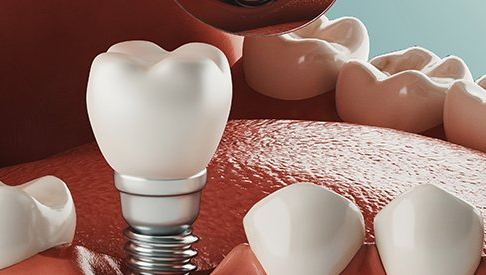Dental Implants

Eventually, many people lose their teeth despite their best efforts to keep them clean with daily dental hygiene. Some tooth loss occurs due to decay. Others lose their teeth from traumatic injuries, and tooth loss is also common among older adults. However tooth loss happens, the person who has lost their teeth may need a solution for eating and speaking comfortably as well as restoring their smile.
Dental implants and dentures are two of the most common solutions used for tooth loss in the United States. While these two options offer similar results, it’s important to know the differences between implants and dentures and the benefits and drawbacks of each.
Dental Implants
As the name suggests, dental implants are implanted into the patient’s jaw using titanium screws. On top of the screw sits an artificial tooth that is just as strong if not stronger than natural tooth enamel. The dental implant is essentially screwed in place of a missing tooth and provides a more permanent solution to missing teeth than a crown or bridge might offer. Since a dental implant is screwed into the jawbone, it can help preserve bone and tissue in the jaw structure, preventing further tooth loss.
Dentures
Dentures are essentially replacement teeth. Typically, dentures consist of multiple replacement teeth set into mouthguard-like devices that rest over the natural gums. Partial dentures may replace several teeth while complete dentures replace all of the user’s natural teeth. These devices are used daily, affixed to the gums with special denture adhesive, and cleaned similarly to how one cleans their natural teeth.
The process of installing dentures is typically simpler than the surgery required for dental implants. However, dentures work on a temporary basis and are not as strong as dental implants. It is also possible to lose or damage dentures. When it comes to semi-permanent dentures like fixed bridges, these fixtures typically require maintenance over time and are vulnerable to damage.
Which Is Best for Me?
If you need to cover up missing teeth and are considering dental implants or dentures, it’s essential to evaluate the benefits and drawbacks of each option. Your dentist can provide specific guidance for your situation so you can make an informed decision. Either route will still require you to practice good daily oral hygiene if you wish to prevent further tooth damage and tooth loss.
When your regular dentist is unavailable and you need repair work done on a bridge, crown, or fixed dentures, it’s essential to find a reliable dental care provider as soon as possible. Contact 24/7 local dentist online or call us at (833) 220-2448 to have our team put you in touch with a 24/7 local dentist.










